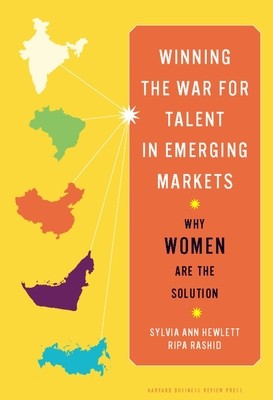
- We will send in 10–14 business days.
- Author: Sylvia Ann Hewlett
- Publisher: Harvard Business Review Press
- ISBN-10: 1422160602
- ISBN-13: 9781422160602
- Format: 16.3 x 24.1 x 2.4 cm, kieti viršeliai
- Language: English
- SAVE -10% with code: EXTRA
Winning the War for Talent in Emerging Markets (e-book) (used book) | bookbook.eu
Reviews
Description
The war for talent is heating up in emerging markets. Without enough "brain power," multinationals can't succeed in these markets. Yet they're approaching the war in the wrong way--bringing in expats and engaging in bidding wars for hotshot local "male" managers.
The solution is hiding in plain sight: the millions of highly educated women surging into the labor markets of Brazil, Russia, India, China, and the United Arab Emirates. Increasingly, these women boast better credentials, higher ambitions, and greater loyalty than their male peers. But there's a catch: Attracting and retaining talented women in emerging economies requires different strategies than those used in mature markets. Complex cultural forces - family-related "pulls," such as daughterly duties to parents and in-laws, and work-related "pushes," such as extreme hours and dangerous commutes - force women to settle for dead-end jobs, switch to the public sector, or leave the workforce entirely. In Winning the War for Talent in Emerging Markets, Sylvia Ann Hewlett and Ripa Rashid analyze these forces and present strategies for countering them, including: - Sustaining ambition through stretch opportunities and international assignments- Combating cultural bias by building an infrastructure for female leadership (networks, mentors, sponsors)
- Introducing flexible work arrangements to accommodate family obligations
- Providing safe transportation, such as employer-subsidized taxi services Drawing on groundbreaking research, amplified with on-the-ground examples from companies as diverse as Google, Infosys, Goldman Sachs, and Siemens, this book is required reading for all companies seeking to strengthen their talent pipeline in these rich and expanding markets.
EXTRA 10 % discount with code: EXTRA
The promotion ends in 23d.08:13:50
The discount code is valid when purchasing from 10 €. Discounts do not stack.
- Author: Sylvia Ann Hewlett
- Publisher: Harvard Business Review Press
- ISBN-10: 1422160602
- ISBN-13: 9781422160602
- Format: 16.3 x 24.1 x 2.4 cm, kieti viršeliai
- Language: English English
The war for talent is heating up in emerging markets. Without enough "brain power," multinationals can't succeed in these markets. Yet they're approaching the war in the wrong way--bringing in expats and engaging in bidding wars for hotshot local "male" managers.
The solution is hiding in plain sight: the millions of highly educated women surging into the labor markets of Brazil, Russia, India, China, and the United Arab Emirates. Increasingly, these women boast better credentials, higher ambitions, and greater loyalty than their male peers. But there's a catch: Attracting and retaining talented women in emerging economies requires different strategies than those used in mature markets. Complex cultural forces - family-related "pulls," such as daughterly duties to parents and in-laws, and work-related "pushes," such as extreme hours and dangerous commutes - force women to settle for dead-end jobs, switch to the public sector, or leave the workforce entirely. In Winning the War for Talent in Emerging Markets, Sylvia Ann Hewlett and Ripa Rashid analyze these forces and present strategies for countering them, including: - Sustaining ambition through stretch opportunities and international assignments- Combating cultural bias by building an infrastructure for female leadership (networks, mentors, sponsors)
- Introducing flexible work arrangements to accommodate family obligations
- Providing safe transportation, such as employer-subsidized taxi services Drawing on groundbreaking research, amplified with on-the-ground examples from companies as diverse as Google, Infosys, Goldman Sachs, and Siemens, this book is required reading for all companies seeking to strengthen their talent pipeline in these rich and expanding markets.


Reviews